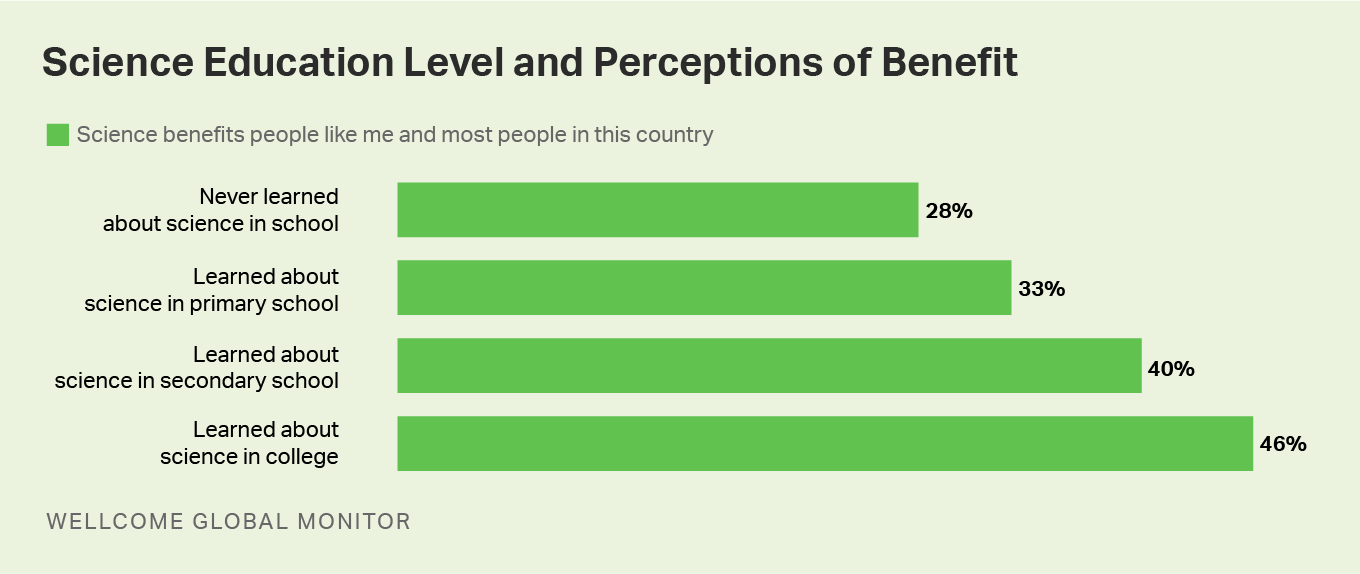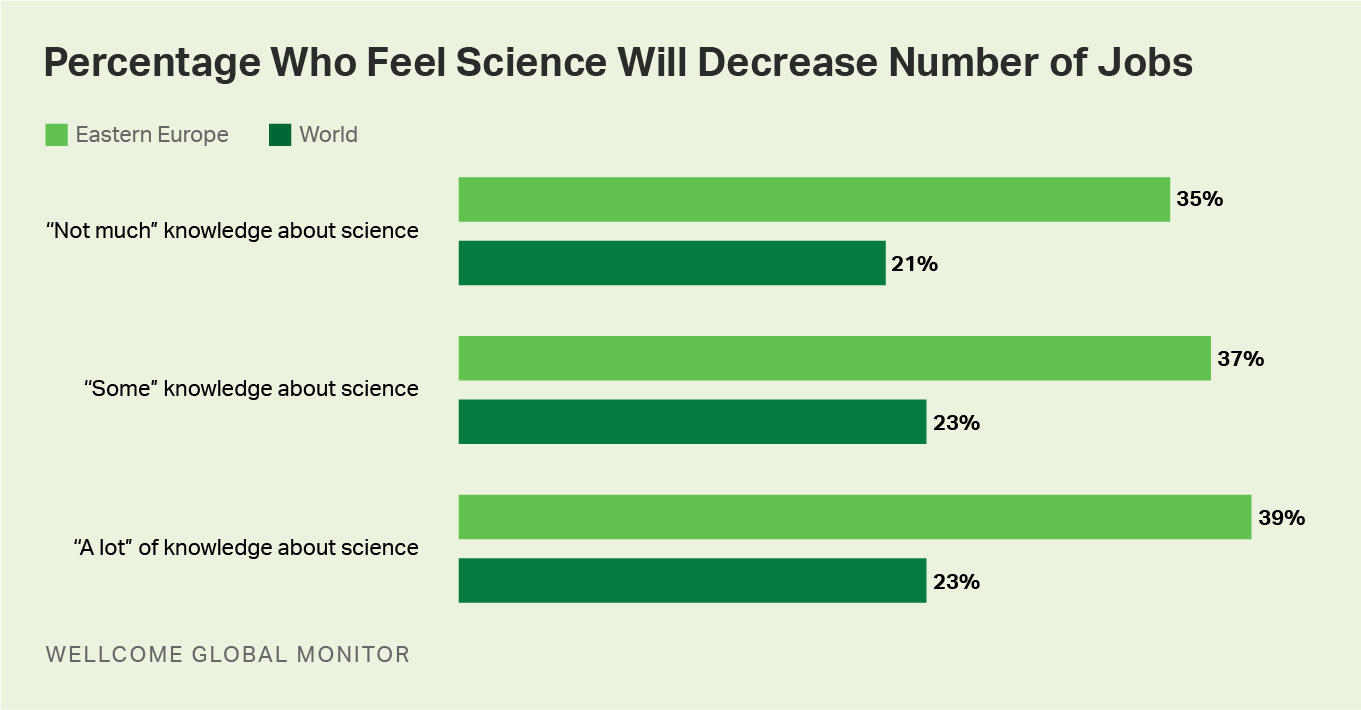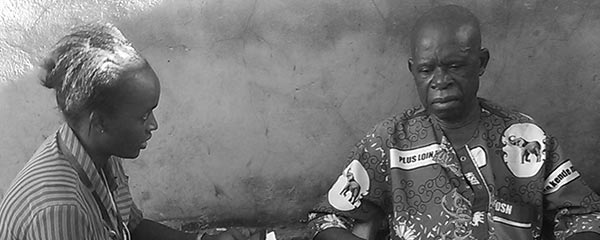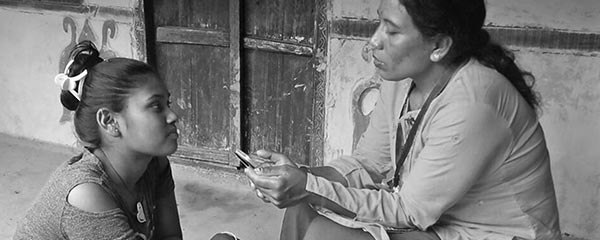Nearly 20 years ago, the U.N. declared November 10 as World Science Day for Peace and Development. This year's theme -- "Open science, leaving no one behind" -- is a call to accelerate momentum on a global movement to make scientific research and data accessible to everyone.
Results from the Wellcome Global Monitor, a global survey that Gallup conducted in partnership with Wellcome, reaffirms the importance of the U.N.'s 2019 theme. The survey shows that confidence in one's own scientific knowledge, exposure to science in education and interest in scientific information are all tied to how much a person believes they benefit from science.
Are the Benefits of Science Felt Globally?
The premise that scientific progress benefits people has been embodied in discoveries throughout the ages -- from the development of vaccinations to the explosion of technology in the past few decades, resulting in billions of supercomputers now resting in the hands and pockets of people worldwide.
Still, not everyone around the world feels science benefits them personally. The Wellcome Global Monitor finds that 20% of people globally do not believe that the work scientists do benefits people like them. In Central America and Mexico, one in every three people feel that science does not benefit them personally, and the highest negative responses come from South America (39%) and Southern Africa (37%).
Further, when asked to what degree scientists' work benefits people in their country as a whole, almost half (49%) say that science only benefits "some" or "very few" people in their country, compared with 41% saying science benefits "most."
With the U.N.'s call to ensure science leaves no one behind, these data raise an important question: Does having access to scientific knowledge lead to people feeling more included in its benefits?
Three trends from the Wellcome Global Monitor results provide strong support that the answer may well be yes.
1. Confidence in Knowledge of Science
Self-assessed scientific knowledge, or confidence in one's own knowledge about science, is crucial. Among adults who say they know "a lot" or "some" about science, 78% agree that science benefits people like them. Given that the Wellcome Global Monitor is a sample of adults aged 15 and older, representative of some 74% of the total global population, we can extrapolate that knowledge plays a part in the perception of benefit for 1.19 billion individuals on our planet. Moreover, those who claim to know "a lot" or "some" about science are 2.1 times more likely to agree that science benefits people like them.
2. Greater Levels of Science Education
A person's level of science education is also closely linked to perceptions of feeling included in the benefits of science. The Wellcome Global Monitor shows that as one's level of science education increases, so does that person's perceptions of science benefiting people like them and most people in their country.

3. A Thirst for More Knowledge
A continued thirst for learning may also fuel the powerful perception of benefit. People who personally tried to get information about science in the past 30 days are almost twice as likely as those who did not to say that science benefits people like them and most people in their country.

Not Everyone Sees Advances in Science as Advantageous
The Wellcome Global Monitor finds that not everyone believes science and technology will bring undisputed benefits to their lives. Many see scientific advancement as a disadvantage in terms of employment opportunities.
Globally, about two in 10 adults (21%) say science and technology will decrease job opportunities in their local area. In Eastern Europe, adults are more likely (by eight percentage points) to say science will decrease job opportunities than to say it will increase them. In Western Europe, there's a similar seven-point gap, with more saying science will decrease rather than increase job opportunities.
Furthermore, in Eastern Europe, higher levels of self-assessed scientific knowledge link to greater pessimism about science's effect on local job opportunities. Among those who report knowing "not much" about science, 35% say science and technology will lead to decreased employment opportunities. This percentage rises to 37% and 39% among those who know "some" and "a lot" about science, respectively.
The global trend is similar to Eastern Europe but far less pronounced. Twenty-three percent of those who report knowing "a lot" or "some" about science say that science will decrease job opportunities, as do 21% of those who report knowing "not much." At the very least, greater knowledge about science does not appear to reduce the number of pessimists on a global scale.

Knowledge of Science May Equal Power, but More Empowerment Is Needed
Despite some believing science may negatively affect the job market, the connection is quite clear: Confidence in one's own scientific knowledge, exposure to science in education, and an interest in scientific information are tied to increased perceptions of benefiting from science. Therefore, the U.N.'s clarion call this weekend to bring science to all is also a call to bring benefit to all -- a confirmation that knowledge is power, or at least it can be.
Data from the Wellcome Global Monitor are open to the public and can be used to further understand how science and society can build an increasingly symbiotic partnership. With data from 144 countries, the findings shared in this article barely scratch the surface.




